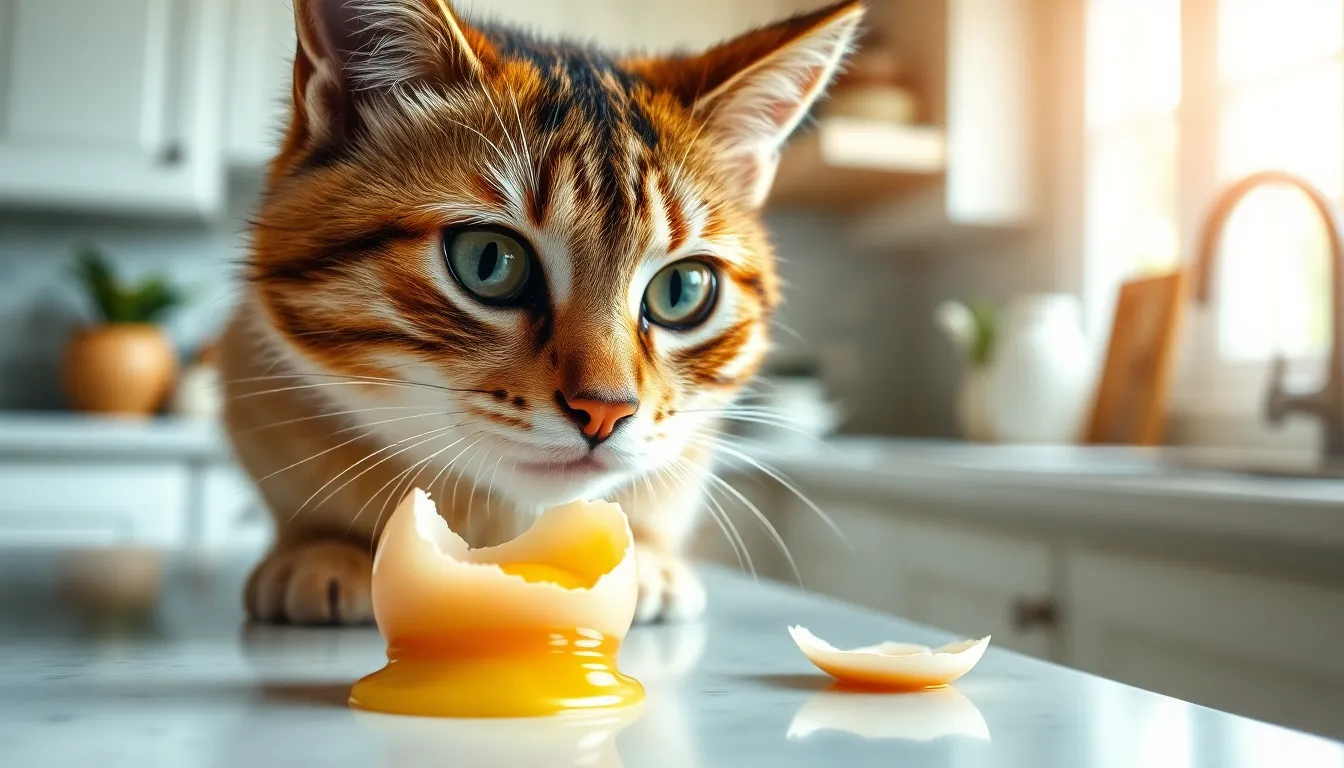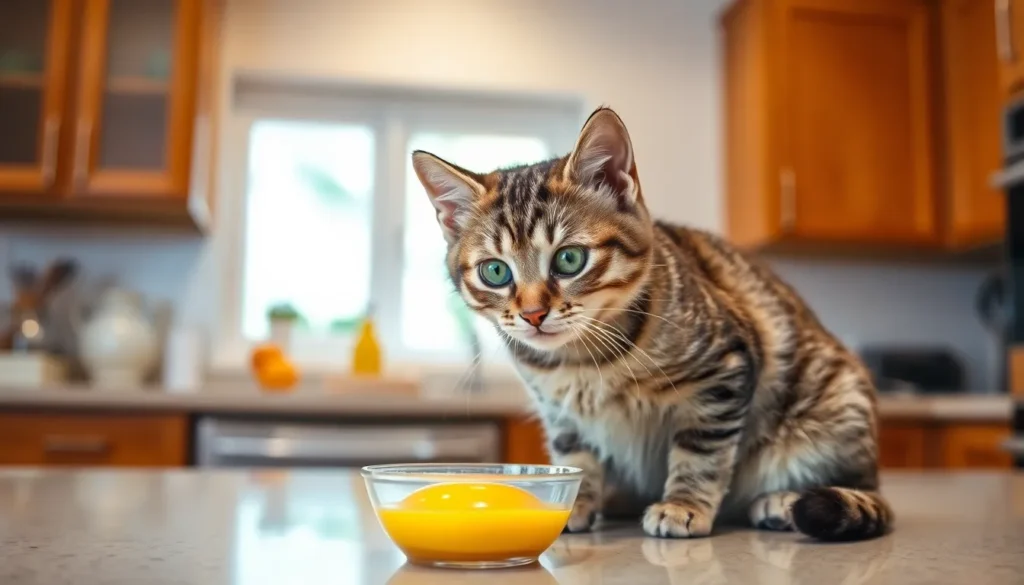Cats are known for their unique dietary needs, often leaving pet owners wondering what foods are safe to share. One common question arises: can cats have egg yolk? While eggs are a popular source of protein for humans, the implications for feline health aren’t always clear.
Understanding whether egg yolk is a suitable treat for cats requires a closer look at their nutritional requirements and potential benefits. With the right approach, introducing egg yolk into a cat’s diet can provide a tasty and nutritious option. However, moderation is key, as not all cats will react the same way. Let’s explore the facts behind this culinary curiosity and help ensure your feline friend enjoys a safe and balanced diet.
Table of Contents
ToggleUnderstanding Cat Nutrition
Understanding feline nutrition involves recognizing the specific dietary needs that help maintain health. A balanced diet supports a cat’s overall well-being and provides necessary nutrients.
Essential Nutrients for Cats
Cats require certain essential nutrients to thrive. Key nutrients include:
- Proteins: Vital for growth and tissue repair, proteins serve as a primary energy source.
- Fats: Supply concentrated energy and support skin and coat health.
- Vitamins: Aid metabolic processes and strengthen the immune system. Key vitamins for cats include A, D, E, and B vitamins.
- Minerals: Important for various bodily functions, minerals like calcium and phosphorus maintain bone health.
- Water: Essential for hydration and proper digestion. Cats often get moisture from their food but need access to fresh water.
Role of Proteins in a Cat’s Diet
Proteins play a crucial role in a cat’s diet. Cats are obligate carnivores, meaning they rely heavily on animal-based proteins for essential amino acids. These amino acids, including taurine and arginine, are necessary for:
- Muscle Health: Proteins support muscle development and maintenance.
- Immune Function: Amino acids help produce antibodies and immune cells.
- Skin and Coat Quality: High-quality protein sources promote a healthy, lustrous coat.
- Hormonal Balance: Proteins contribute to hormone production and regulation.
Incorporating protein-rich foods, like cooked egg yolk, can provide additional benefits. However, moderation is essential, as too much protein can strain the kidneys.
Can Cats Have Egg Yolk?

Cats can consume egg yolk in moderation. It contains essential nutrients that may benefit their health, but it’s crucial to understand both the advantages and risks associated with its inclusion in a feline diet.
Nutritional Benefits of Egg Yolk
- High in Protein: Egg yolks contain approximately 2.7 grams of protein per yolk, contributing to muscle maintenance and overall health.
- Rich in Fats: Yolk delivers healthy fats that support energy levels and skin quality, crucial for a cat’s aesthetic and internal health.
- Vitamins and Minerals: Egg yolk is a source of vitamins A, D, E, and B-complex, which help in vision, bone health, and immune function.
- Choline Source: The yolk provides choline, important for brain development and function.
- B Vitamin Content: B vitamins found in egg yolk support energy metabolism and the overall health of the nervous system.
Risks of Feeding Egg Yolk to Cats
- Biotin Deficiency: Raw egg yolk contains avidin, which can bind to biotin and lead to deficiencies if fed excessively. Cooking the yolk reduces this risk.
- Allergic Reactions: Some cats may show allergic reactions to egg yolk. Signs include itching, gastrointestinal upset, or swelling.
- High-Calorie Content: Egg yolks are calorie-dense. Overfeeding may lead to obesity, impacting overall health and longevity.
- Potential for Salmonella: Raw egg yolk may harbor bacteria such as Salmonella, which can affect both cats and humans. Cooking eliminates this risk.
- Kidney Strain: Excessive protein and fat intake may strain a cat’s kidneys, particularly in older cats or those with pre-existing conditions. Moderation is critical.
How to Safely Feed Egg Yolk to Cats
Feeding egg yolk to cats requires careful consideration of serving sizes and preparation methods to ensure safety and health benefits. Following recommended guidelines can help incorporate this food into a cat’s diet appropriately.
Recommended Serving Sizes
- Start Small: For cats unfamiliar with egg yolk, beginning with a small amount, such as 1/4 of a yolk, allows for observation of any adverse reactions.
- Frequency Matters: Offering egg yolk no more than once or twice a week helps maintain a balanced diet and prevents excessive calorie intake.
- Monitor Weight: Regularly checking a cat’s weight ensures that the addition of egg yolk does not contribute to obesity or other health issues.
Preparation Tips for Egg Yolk
- Cook Thoroughly: Cooking the yolk eliminates the risk of Salmonella while also making nutrients more bioavailable.
- Avoid Additives: Serve plain cooked yolk without butter, oil, or seasoning to maintain its nutritional integrity and prevent gastrointestinal upset.
- Mash or Blend: Mashing or blending the cooked yolk can enhance palatability and make it easier for cats to consume.
- Mix with Regular Food: Combining egg yolk with a cat’s regular food helps distribute flavors and encourages acceptance, making it a delightful treat.
Alternatives to Egg Yolk
While egg yolk can be a beneficial treat for cats in moderation, various alternatives provide essential nutrients. Exploring other food options ensures a balanced diet that meets feline health needs.
Other Nutritional Sources for Cats
- Meat: Cooked chicken, turkey, or beef delivers high-quality protein. Cats thrive on animal-based proteins for muscle maintenance and overall health.
- Fish: Salmon and tuna serve as rich sources of omega-3 fatty acids. These fats promote a healthy coat and skin, supporting overall vitality.
- Liver: Beef or chicken liver offers vitamins A and D. Moderation is crucial, as excessive liver can lead to vitamin A toxicity.
- Dairy: Plain, unsweetened yogurt contains probiotics that contribute to digestive health. However, monitor for lactose intolerance signs in cats.
- Vegetables: Cooked carrots, peas, and pumpkin provide fiber and vitamins. These foods can aid digestion and prevent obesity when given in moderation.
Balancing Your Cat’s Diet
- Protein Ratio: Ensure protein makes up 35-50% of daily caloric intake. Focus on high-quality animal sources for optimal amino acid profiles.
- Incorporate Fats: Healthy fats should comprise about 20-30% of the diet. Consider fish oil or chicken fat to enhance nutrient absorption and energy levels.
- Vitamins and Minerals: Include necessary vitamins like taurine, which is essential for heart and eye health. Commercial cat food often meets these needs.
- Hydration: Fresh water should always be available. Proper hydration supports kidney health and overall bodily functions.
- Portion Control: Monitor food portions to prevent obesity. Regular weight checks are essential, adjusting food amounts as needed.
By incorporating diverse food sources and balancing nutrients, a cat’s health and well-being improve without relying heavily on egg yolk.
Feeding egg yolk to cats can be a nutritious addition when done correctly. It’s packed with essential nutrients that can support a cat’s overall health. However moderation is key to avoid potential health risks such as obesity or kidney strain.
Cats thrive on a balanced diet that includes a variety of protein sources and other nutrients. By following the guidelines for serving sizes and preparation methods, pet owners can safely introduce egg yolk into their feline’s diet.
Ultimately a diverse diet ensures cats receive the necessary nutrients they need to thrive while keeping their meals exciting and satisfying.










